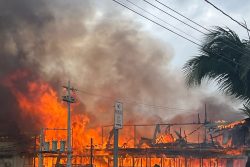Dear Editor,
Great and persistent inequality in the midst of plenty is a paradox of our times. Over the last few decades, innovation has exploded from our increasingly digital age, absolute poverty rates have declined in every region of the world and emerging market countries have experienced unprecedented growth. Nevertheless, global income inequality stands at very high levels whereby the richest eight per cent of the world’s population earn half of the world’s total income while the remaining 92 per cent of people are left with the other half (World Bank research paper). Such gaps have left many on the precipice of steep decline. With insecure livelihoods, volatile markets and unreliable services, many people feel increasingly threatened by the prospect of falling below the poverty line and into poverty traps, as many in fact have.
Soaring inequalities distort budges and political processes, leaving them even more attuned to elites. This makes it more difficult for citizens to have a say in the decisions which impact on them and live the lives they value. Reminders of the sharp differences in wealth, education, and other material resources influence the way in which people view themselves and others and can make the equal participation of citizens in political and public life almost impossible (UN report, Nov 2013).
Editor, as I observe youth involvement in crime, youth suicides and perhaps youth’s general sense of apathy, I must face the harsh reality that the youth of Guyana are feeling hopeless instead of hopeful.
With more than 20 suicides in 2014, our nation’s future generation appears to be adrift. Greed, gluttony and a general attitude of selfishness are sweeping across Guyana, leaving many in hardship, while the oligarchs continue to exploit and plunder the resources of Guyana.
The social decay is evident as you take a glimpse at the daily news; hardly a day goes by without horrible incidents being reported and the negatives far outweigh the positives. Social workers are the ‘frontline workers’ who get up daily and go to work (those of us who are employed) and try to give hope to the hopeless, comfort to the comfortless, and empathy in a society gripped by apathy. Have we sunk into the abyss?
The entrenched elites must take cognizance of the fact that everyone outside their circle are human beings with basic needs, and many struggle to meet the basic needs of their families. Do they care? For women left to raise children alone, they are the most vulnerable to human trafficking which is modern-day slavery. The commercial sexual exploitation of children is the worst form of child labour, and to listen to a 16-year-old tell her story of trying to earn a living to care for her baby all alone, is indeed a reflection on the society. Where are the safety nets for the nation’s youth? Why aren’t the social institutions functioning?
Who’s responsible? If our youth are really to be the future then we must ensure that that future is bright and not bleak. It is incumbent upon us all as leaders of civil society to leave a legacy of hope and not despair. The youths are dying.
Yours faithfully,
Nicole Cole







